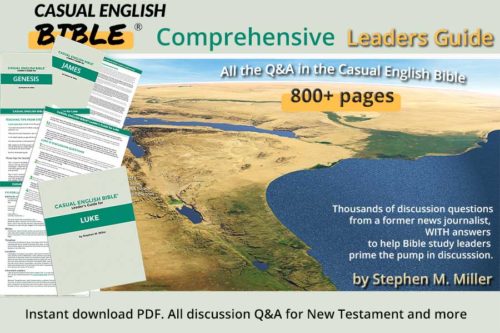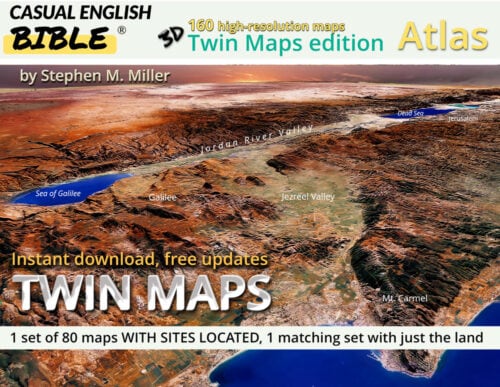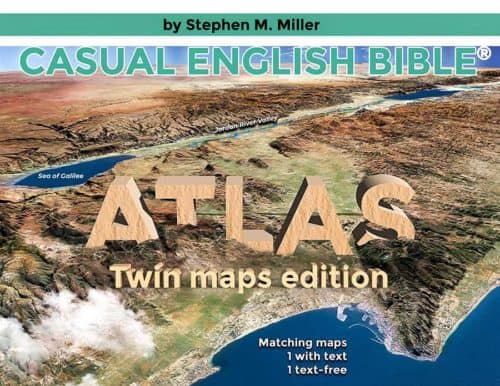Judges 18
Dan sends scouts to find land
Dan sends scouts to find land
1Israel still didn’t have a king. And the tribe of Dan didn’t have any land. 2So, they sent five brave men from the tribal camps at Zorah and Eshtaol on a scouting mission. Their orders: “Take a look around and see what you can find.” They made their way to the Ephraim hills, where they stayed in Micah’s house. 3While they were there, they heard the Levite talking and they recognized his accent. So, they walked over to him and said, “What in the world are you doing here? And how did you get here? Who brought you?”4The Levite told them what happened and said, “Micah hired me to serve as his priest.”
5The scouts said, “We’re on a mission. Would you ask God if we’re going to succeed?”
6The priest answered, “Don’t worry. The LORD is keeping a close eye on you. Go in peace.”
7Dan’s five scouts went to the city of Laish. [1] They saw that the people were doing well for themselves. Some were rich. From what the scouts could tell, it looked like the people had come from Sidon. They were living peaceful lives. And they didn’t seem to realize how vulnerable they were, cut off from Sidon by a long distance. They didn’t have any neighboring allies, either. 8When the scouts got back to Zorah and Eshtaol, their people asked them, “What did you see?” 9The scouts said, “We need to get going. We found some great land. So, hurry up and let’s go take it. 18:10. What you’ll find when you get there are people who aren’t ready to defend themselves. They have no idea what’s coming. The land is wide open and sprawling. It’s God’s gift to you, just waiting for you to take it.”
Dan goes to war
11Six hundred armed warriors of Dan led the people from their base camps at Zorah and Eshtaol. 12They made camp in Judah’s territory at Kiriath-jearim. [2] Afterward, folks called that site Dan’s Camp. That’s still the name. 13The people traveled up into the hills of Ephraim and came to Micah’s house.14The five men who had scouted Laish told the others, “The guy who lives here has a shrine set up with a molded idol and an ephod [3] draped over it. He also has another object used to predict the future.” [4] 15When they got to Micah’s house, the young Levite welcomed them. 16Dan’s 600 armed warriors stood by the gated entrance onto the property.
Scouts steal an idol
17The five scouts who had visited Micah’s house earlier went inside and cleaned out the shrine. They packed up the idol, the ephod, and the other object used to predict the future. The priest was still outside at the gate, with the 600 warriors. 18When the priest saw the scouts carrying the shrine objects, he said, “What are you doing with that?”19They said, “Shut your mouth. Just keep quiet. Come with us. Do you want to be a priest to one man or a priest to a tribe?”
20The priest agreed to go with them. He carried the idol and the other shrine objects as he left with the warriors.
Micah confronts the thieves
21The tribe left the area. The warriors put the children and livestock at the front, so the warriors could protect them from the rear. 22Micah and his men eventually caught up and yelled out to them. 23When they shouted, one of Dan’s men yelled back, “Why are you coming at us with a group of people like that?”24Micah shouted back, “You steal my gods—which I made myself—and you take my priest, too. Then you have the nerve to ask me what’s wrong?”
25Someone from Dan shouted, “Watch your tone. We’ve got some hot-tempered guys over here. You don’t want them to kill you and your family.” 26Dan’s tribe moved on. Micah went home. Dan had a bigger army than he did.
Dan takes Laish by surprise
27So, Dan’s tribe stole Micah’s shrine and his priest. Then they arrived at Laish, where they surprised and killed all the unsuspecting people. They torched the city. 28The people of Laish had no one to rescue them. They were too far from their own people in Sidon. And they had no neighboring allies. The city was nestled in a valley close to Beth-rehob. 29Dan’s tribe rebuilt the city, settled there, and renamed it Dan, after their ancestral father, Dan was the son of Jacob, also known as Israel. But the city’s original name was Laish. 30The people of Dan set up a shrine with the idol they stole. Sons of Jonathan served as tribal priests until the people were taken captive. [5] Jonathan was a descendant of Moses and Gershom. 31The people of Dan kept their shrine with its idol for as long as Israelites kept the tent worship center [6] at Shiloh.Footnotes
Also known as the city of Dan, located at the southern foot of Mount Hermon. Laish was about a two-day walk from Sidon, Lebanon, roughly 40 miles (64 km).
Located west of Jerusalem, on Dan’s border with Judah and Benjamin. Also known as Kiriath-baal (Joshua 18:14).
An ephod in the time of Moses was an apron or vest worn by the high priest. Scholars debate exactly what that looked like. Some describe it as a skirt or a shift-like garment that covered the body from about the waist to the mid-thigh. Priests used what was described as an ephod to store the sword of Goliath, after David killed this Philistine champion warrior (1 Samuel 23:9). But here, as with Gideon’s ephod (8:27), the ephod is somehow set up as an object that people could visit and worship (17:5). Some scholars suggest the Hebrew word ephod was related to the Akkadian word epattu. Assyrian writings say epattu were idols dressed in expensive clothing worn by high officials.
The second mysterious object was a teraphim. The prophet Zechariah suggests that dream interpreters used them to explain the meaning of dreams and visions and to predict the future, which Zechariah called out as lies (Zechariah 10:2).
The writer doesn’t say which captivity. Many scholars say it refers to Assyrian king Sargon II, from what is now Iraq, deporting what he reported as 27,290 people from what is now northern Israel. In 732 BC, he sent them to Iraq, known then as Mesopotamia, the “land between the rivers,” the Tigris and Euphrates. These deported Israelites from the 10 northern tribes became known as the Ten Lost Tribes of Israel.
Also known as the Tabernacle. For a detailed description, see Exodus 25-27.
Discussion Questions
- Sorry, there are currently no questions for this chapter.










